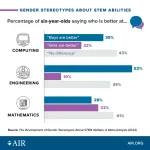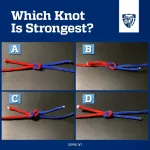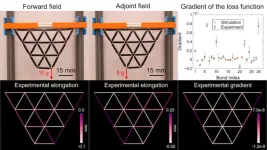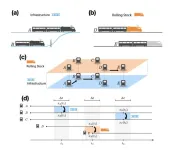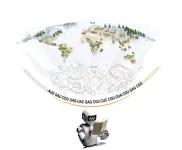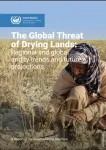(Press-News.org) Arlington, Va. – Children as young as age 6 develop gender stereotypes about computer science and engineering, viewing boys as more capable than girls, according to new results from an American Institutes for Research (AIR) study. However, math stereotypes are far less gendered, showing that young children do not view all science, technology, engineering, and math (STEM) fields as the same.
These new findings come from the largest-ever study on children’s gender stereotypes about STEM and verbal abilities, based on data from 145,000 children across 33 nations, synthesizing more than 40 years of research. The results of the AIR study were published on Dec. 9 in Psychological Bulletin, a journal of the American Psychological Association.
“The early emergence of these biases signals that kids acquire messages about computing and engineering stereotypes at home and in other environments before K‑12 schooling,” said David Miller, lead author and senior researcher at AIR. “Parents, early childhood educators, and out-of-school-time programs have a key role to play in helping to reshape these narratives.”
As girls age, their male-STEM bias increases, which could potentially limit their future aspirations for fast-growing tech fields, such as artificial intelligence. Miller said the results make clear the need for targeted interventions.
“Initiatives focused on ‘girls in math’ or ‘girls in STEM’ may fall short of addressing the most entrenched male-biased beliefs,” he said. “These initiatives need dedicated attention on girls in computing and engineering, especially in early childhood, before these stereotypes set in.”
Other notable findings from the AIR study include:
At all ages, math stereotypes remain far less gendered than computing or engineering stereotypes, contrary to assumptions that “girls are bad at math” is a widespread belief.
While boys are seen as better in physics, girls are seen as better in biology, showing notable divides even within science fields.
Girls are seen as far superior in verbal domains, such as reading and writing – a belief that emerges by age 8 and strengthens in older ages.
With funding from the National Science Foundation, the AIR team led a comprehensive review of 98 studies, spanning data from 1977 to 2020.
Visit AIR.org to learn more about AIR's work related to increasing diversity in STEM and in broadening STEM participation by women, racial and ethnic minorities, and people with disabilities. You can also learn more about meta-analysis and similar projects conducted by AIR experts.
About AIR
Established in 1946, the American Institutes for Research (AIR) is a nonpartisan, not-for-profit organization that conducts behavioral and social science research and delivers technical assistance both domestically and internationally in the areas of education, health, and the workforce. AIR’s work is driven by its mission to generate and use rigorous evidence that contributes to a better, more equitable world. With headquarters in Arlington, Virginia, AIR has offices across the U.S. and abroad. For more information, visit www.air.org.
END
By age six, children think boys are better than girls at computing and engineering, new American Institutes for Research study shows
However, stereotypes are far less gendered in math
2024-12-09
ELSE PRESS RELEASES FROM THIS DATE:
Hair growth drug safe at low doses for breast cancer patients
2024-12-09
Hair loss during chemotherapy can cause enough distress for some women to lose self-confidence, which experts say may discourage them from seeking chemotherapy in the first place.
Oral minoxidil is a commonly prescribed treatment for hair loss. The drug is also the active ingredient in over-the-counter Rogaine. The prescription treatment is known, however, to dilate blood vessels, and experts worry that this could increase the heart-related side effects of chemotherapy and lead to chest pain, shortness of breath, or fluid buildup.
Now, a study in women with breast cancer suggests that low oral doses of minoxidil, taken during ...
Giving a gift? Better late than never, study finds
2024-12-09
COLUMBUS, Ohio – If you feel terrible about giving a late gift to a friend for Christmas or their birthday, a new study has good news for you.
Researchers found that recipients aren’t nearly as upset about getting a late gift as givers assume they will be.
“Go ahead and send that late gift, because it doesn’t seem to bother most people as much as givers fear,” said Cory Haltman, lead author of the study and doctoral student in marketing at The Ohio State University’s Fisher College of Business.
In a series of six studies, Haltman and his colleagues explored the mismatch between givers’ ...
Judging knots throws people for a loop
2024-12-09
We tie our shoes, we put on neckties, we wrestle with power cords. Yet despite deep familiarity with knots, most people cannot tell a weak knot from a strong one by looking at them, new Johns Hopkins University research finds.
Researchers showed people pictures of two knots and asked them to point to the strongest one. They couldn’t.
They showed people videos of each knot, where the knots spin slowly so they could get a good long look. They still failed.
People couldn’t even manage it ...
Not so simple machines: Cracking the code for materials that can learn
2024-12-09
It's easy to think that machine learning is a completely digital phenomenon, made possible by computers and algorithms that can mimic brain-like behaviors.
But the first machines were analog and now, a small but growing body of research is showing that mechanical systems are capable of learning, too. Physicists at the University of Michigan have provided the latest entry into that field of work.
The U-M team of Shuaifeng Li and Xiaoming Mao devised an algorithm that provides a mathematical framework for how learning works in lattices called ...
Finding the weak points: New method to prevent train delay cascades
2024-12-09
[Vienna, 09.12.2024] —Train delays are not only a common frustration for passengers but can also lead to significant economic losses, especially when they cascade through the railway network. When a train is delayed, it often triggers a chain reaction, turning minor issues into widespread delays across the system. This can be costly. A report from the Association of American Railroads (AAR) indicates that a nationwide rail disruption in the US could cost the economy over $2 billion per day. Therefore, the pressing question for railway operators is: How to manage the cascading effect of delays efficiently ...
New AI cracks complex engineering problems faster than supercomputers
2024-12-09
Modeling how cars deform in a crash, how spacecraft responds to extreme environments, or how bridges resist stress could be made thousands of times faster thanks to new artificial intelligence that enables personal computers to solve massive math problems that generally require supercomputers.
The new AI framework is a generic approach that can quickly predict solutions to pervasive and time-consuming math equations needed to create models of how fluids or electrical currents propagate through different ...
Existing EV batteries may last up to 40% longer than expected
2024-12-09
The batteries of electric vehicles subject to the normal use of real world drivers - like heavy traffic, long highway trips, short city trips, and mostly being parked - could last about a third longer than researchers have generally forecast, according to a new study by scientists working in the SLAC-Stanford Battery. Center, a joint center between Stanford University's Precourt Institute for Energy and SLAC National Accelerator Laboratory, This suggests that the owner of a typical EV may not need to replace the expensive battery pack or buy a new car for several additional years.
Almost always, battery scientists and engineers have tested ...
Breakthrough AI model can translate the language of plant life
2024-12-09
A pioneering Artificial Intelligence (AI) powered model able to understand the sequences and structure patterns that make up the genetic “language” of plants, has been launched by a research collaboration.
Plant RNA-FM, believed to be the first AI model of its kind, has been developed by a collaboration between plant researchers at the John Innes Centre and computer scientists at the University of Exeter.
The model, say its creators, is a smart technological breakthrough that can drive discovery and innovation in plant science and potentially across the study of invertebrates ...
MASH discovery redefines subtypes with distinct risks: shaping the future of fatty liver disease treatment
2024-12-09
Metabolic dysfunction-associated steatotic liver disease (MASLD), formerly referred to as nonalcoholic fatty liver disease (NAFLD), impacts roughly 30% of the global adult population. The disease spans from benign fat accumulation in the liver (steatosis) to its more severe form, metabolic dysfunction-associated steatohepatitis (MASH, formerly nonalcoholic steatohepatitis or NASH). MASH represents a dangerous progression, with the potential to cause cirrhosis, liver cancer, type 2 diabetes, and cardiovascular disease.
Despite ...
Three-quarters of Earth’s land became permanently drier in last three decades: UN
2024-12-09
Even as dramatic water-related disasters such as floods and storms intensified in some parts of the world, more than three-quarters of Earth’s land became permanently drier in recent decades, UN scientists warned today in a stark new analysis.
Some 77.6% of Earth’s land experienced drier conditions during the three decades leading up to 2020 compared to the previous 30-year period, according to the landmark report from the UN Convention to Combat Desertification (UNCCD).
Over the same period, drylands expanded by about 4.3 million km2 – an area nearly a third larger than India, the world’s ...
LAST 30 PRESS RELEASES:
Transient Pauli blocking for broadband ultrafast optical switching
Political polarization can spur CO2 emissions, stymie climate action
Researchers develop new strategy for improving inverted perovskite solar cells
Yes! The role of YAP and CTGF as potential therapeutic targets for preventing severe liver disease
Pancreatic cancer may begin hiding from the immune system earlier than we thought
Robotic wing inspired by nature delivers leap in underwater stability
A clinical reveals that aniridia causes a progressive loss of corneal sensitivity
Fossil amber reveals the secret lives of Cretaceous ants
Predicting extreme rainfall through novel spatial modeling
The Lancet: First-ever in-utero stem cell therapy for fetal spina bifida repair is safe, study finds
Nanoplastics can interact with Salmonella to affect food safety, study shows
Eric Moore, M.D., elected to Mayo Clinic Board of Trustees
NYU named “research powerhouse” in new analysis
New polymer materials may offer breakthrough solution for hard-to-remove PFAS in water
Biochar can either curb or boost greenhouse gas emissions depending on soil conditions, new study finds
Nanobiochar emerges as a next generation solution for cleaner water, healthier soils, and resilient ecosystems
Study finds more parents saying ‘No’ to vitamin K, putting babies’ brains at risk
Scientists develop new gut health measure that tracks disease
Rice gene discovery could cut fertiliser use while protecting yields
Jumping ‘DNA parasites’ linked to early stages of tumour formation
Ultra-sensitive CAR T cells provide potential strategy to treat solid tumors
Early Neanderthal-Human interbreeding was strongly sex biased
North American bird declines are widespread and accelerating in agricultural hotspots
Researchers recommend strategies for improved genetic privacy legislation
How birds achieve sweet success
More sensitive cell therapy may be a HIT against solid cancers
Scientists map how aging reshapes cells across the entire mammalian body
Hotspots of accelerated bird decline linked to agricultural activity
How ancient attraction shaped the human genome
NJIT faculty named Senior Members of the National Academy of Inventors
[Press-News.org] By age six, children think boys are better than girls at computing and engineering, new American Institutes for Research study showsHowever, stereotypes are far less gendered in math
